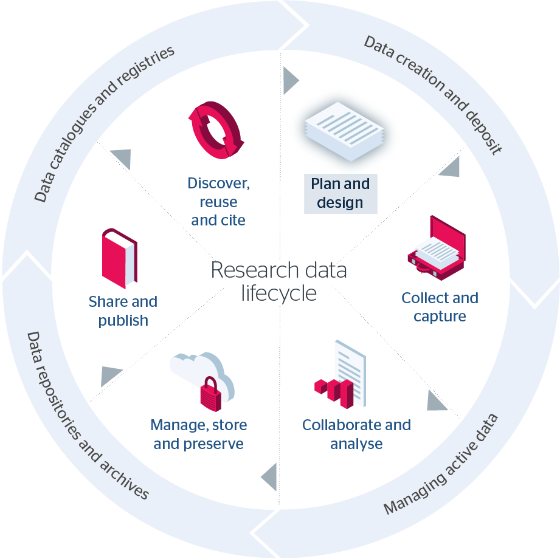
Data Manage-ment Plans
How to write a data management plan
All research involves the creation or use of data in some way in order to support or validate its claims to knowledge. Good research data management plays an important role in the integrity of a research project and needs to be present throughout its lifecycle, from the early planning stages, to data collection, analysis, and sharing and archiving at the end of the project. More and more funders, such as the UK Research Councils, require the projects they fund to consider how they will manage their data, including how they will share the data and make it accessible to the public.

Effective management of research data improves efficiency, reduces the risk of loss of data, and enables data to be re-used and shared, thus providing best value for money.
Sharing your research data has a number of benefits:
The University of Wolverhampton recognises the importance of sharing research data to both research excellence and the research community: the Research Data Management Policy highlights the university’s commitment to the effective management of research data.
The Digital Curation Centre provides useful summaries of UK funders’ data policies including the UK Research Councils, the European Commission (Horizon 2020) and the Wellcome Trust. See below for individual data management plan/policy requirements:
Arts and Humanities Research Council (AHRC)
Biotechnology and Biological Sciences Research Council (BBSRC)
Engineering and Physical Sciences Research Council (EPSRC)
Economic and Social Research Council
Natural Environment Research Council (NERC)
Jisc Research Data Management Toolkit Provides guidance on data management planning, policy compliance, storing and backing up active data, data preservation and protecting personally identifiable information.
UK Data Service guidance for managing data Information on data management planning, legal and ethical issues, documenting and formatting data, tools and templates.
MANTRA Free online course provided by the University of Edinburgh.
CESSDA Guide created by European experts, aimed at social science researchers but with accessible to researchers from a variety of disciplines.
Coursera Free comprehensive course covering a range of topics including data management planning, archiving and using metadata.
The pages below provide guidance on managing your data during both the active phase of your research and once your research project has ended.
For more information and support with managing your research data, please contact the Scholarly Communications Team: WIRE@wlv.ac.uk

How to write a data management plan

How to find and re-use data in your research projects

How to manage your data during your research project

How to preserve and share your data when your research project ends
Images used on this page
Research data lifecycle by JISC under a CC licence
Photo by Glenn Carstens-Peters on Unsplash
Photo by John Schnobrich on Unsplash
Photo by UX Indonesia on Unsplash
Photo by andrew welch on Unsplash